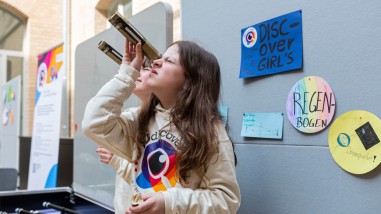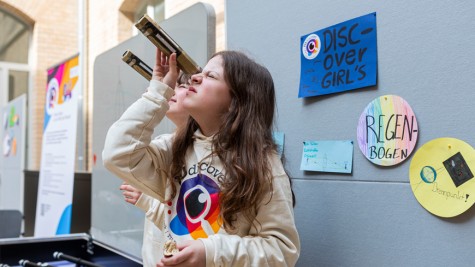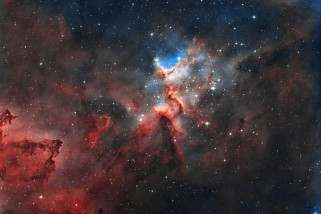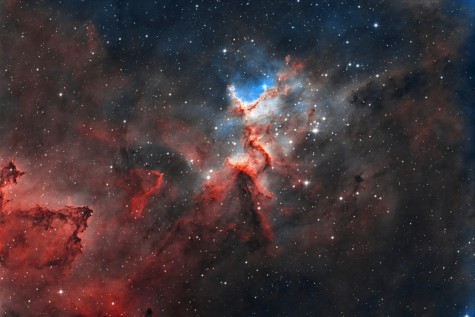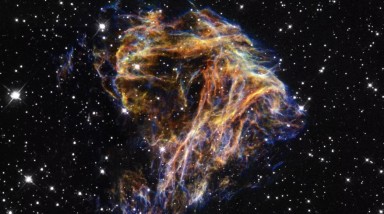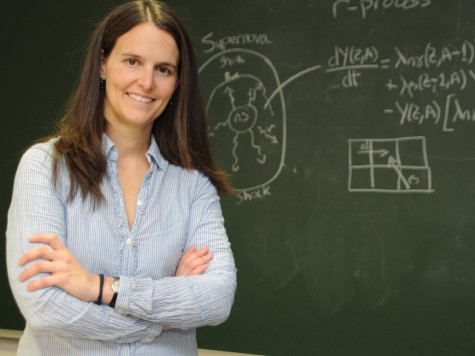Department of Physics
Astrophysics
News tagged with “Astrophysics”
-
![]()
![]()
Sternenstaub im Stream!
2025/05/14
Die TUdiscover-Sternennacht begeisterte rund 250 Zuschauer*innen
Am 26. April 2025 fand die TUdiscover-Sternennacht des Fachbereichs Physik der TU Darmstadt statt
-
![]() Bild: Lena Schwind
Bild: Lena Schwind![]() Bild: Lena Schwind
Bild: Lena SchwindTUdiscover-Girls’ Camp 2025
2025/04/17
Eine Woche voller Neugier, Entdeckungen & Physik!
Was für eine großartige Woche! Gemeinsam mit 25 Mädchen der Klassen 5 bis 7 haben wir im Rahmen des TUdiscover-Girls’ Camps des Fachbereichs Physik experimentiert, gefragt, geforscht – und vor allem: ganz viel gestaunt!
-
![]() Bild: TURM-Observatorium
Bild: TURM-Observatorium![]() Bild: TURM-Observatorium
Bild: TURM-ObservatoriumLive-Beobachtung der partiellen Sonnenfinsternis
2025/03/12
Samstag, 29. März 2025 | 11:00 – 13:00 Uhr | Online auf Twitch
Am 29. März erwartet uns ein besonderes Himmelsereignis: eine partielle Sonnenfinsternis! Das TURM Observatorium überträgt das Ereignis live auf Twitch und bietet spannende Einblicke in das Geschehen.
-
![]()
![]()
Sternennacht des TUdiscover-Girls’ Camp
2025/03/12
Achtung: Neuer Termin! | 26. April 2025 | 22:00 Uhr | Online auf Twitch
Im TUdiscover-Girls’ Camp haben die begeisterten Schülerinnen mit einer Planetarium-App und Tablets ihre eigene Sternennacht geplant.
-
![]()
![]()
Starry Night – Winter Edition
2024/12/16
An interactive journey into the depths of the universe with the telescopes of the TURM Observatory
Have you ever seen the birthplace of stars or the remains of a stellar explosion? An interactive journey into the depths of the universe awaits you at the Starry Night – Winter Edition.
-
![]() Picture: Danielle Adams for TRIUMF
Picture: Danielle Adams for TRIUMF![]() Picture: Danielle Adams for TRIUMF
Picture: Danielle Adams for TRIUMFHow long did it take for our sun to form?
2024/11/14
Long-sought measurement to determine the timescale of the Sun’s birth
Have you ever wondered how long it took our Sun to form in its stellar nursery? An international collaboration of scientists is now closer to an answer. They succeeded in the measurement of the bound-state beta decay of fully-ionised thallium (205Tl81+) ions at the Experimental Storage Ring (ESR) of GSI/FAIR. This measurement has profound effects on the production of radioactive lead (205Pb) in asymptotic giant branch (AGB) stars and can be used to help determine the Sun’s formation time. The results have been published in the journal Nature.
-
![]() Picture: Hubble Heritage Team/Y. Chu et al/NASA
Picture: Hubble Heritage Team/Y. Chu et al/NASA![]() Picture: Hubble Heritage Team/Y. Chu et al/NASA
Picture: Hubble Heritage Team/Y. Chu et al/NASASynthesis of rare nuclei in the Universe
2024/05/13
Research team suggests new process
A new nucleosynthesis process denoted the νr-process has been suggested by scientists from GSI Helmholtzzentrum für Schwerionenforschung, Technische Universität Darmstadt, and the Max Planck Institute for Astrophysics. It operates when neutron-rich material is exposed to a high flux of neutrinos. The theoretical proposal, which was recently published in “Physical Review Letters”, may be the solution to a long-standing issue related to the production of a group of rare isotopes present in the solar system but whose origin is still poorly understood, the so-called p-nuclei.
-
![]() Picture: Gabriele Otto
Picture: Gabriele Otto![]() Picture: Gabriele Otto
Picture: Gabriele OttoMax Planck Fellowship for Almudena Arcones
2024/02/27
Origin of heavy elements: Nuclear matter under extreme conditions
The President of the Max Planck Society has appointed Prof Dr Almudena Arcones from the Technical University of Darmstadt as a Max Planck Fellow at the Max-Planck-Institute for Nuclear Physics (MPIK) in Heidelberg. Within the framework of the Fellowship, she will lead the theoretical research group “Theoretical nuclear astrophysics and the origin of heavy elements in the universe” starting 1 March 2024, working closely with the experimental department of Prof Klaus Blaum (MPIK).
-
![DeepSky-Foto des Orion Nebels, TURM Observatory]() Picture: Robert Roth/TURM Observatory
Picture: Robert Roth/TURM Observatory![DeepSky-Foto des Orion Nebels, TURM Observatory]() Picture: Robert Roth/TURM Observatory
Picture: Robert Roth/TURM ObservatoryA winter walk through the universe
2022/12/19
Virtual journey to distant galaxies on 27 December 2022
Between the years, the Hessian Cluster Project ELEMENTS together with the TU Darmstadt invites you again to a very special kind of walk: We will explore the universe in a digital live stream on Tuesday, 27 December 2022, starting at 7:30 pm!
-
![]() Picture: Gregor Rynkowski
Picture: Gregor Rynkowski![]() Picture: Gregor Rynkowski
Picture: Gregor RynkowskiLooking into space
2021/09/29
An observatory enriches teaching in the Department of Physics at TU Darmstadt
The way to the stars leads through an inconspicuous door in the panelling of the lecture hall in the Uhrturm building, and then up a steep grid staircase to a hatch in the ceiling. Anyone who climbs through it will find themselves in front of TU's observatory, which is surrounded by the protective glass cube on top of the tower. Four remote-controlled telescopes are aimed up into the sky, observing the sun by day and clusters of stars, nebulae and galaxies by night. The images and data that are recorded are used in lab courses and teaching in the Department of Physics.
-
![]() Picture: ESA/Hubble & NASA
Picture: ESA/Hubble & NASA![]() Picture: ESA/Hubble & NASA
Picture: ESA/Hubble & NASA“Europium stars” in the dwarf galaxy Fornax
2021/05/18
Team discovers highest ever observed europium content in stars
A physics research team led by the TU Darmstadt has discovered the highest ever observed europium content in stars. The results of the EUROPIUM group led by Professor Almudena Arcones, who was awarded a grant by the European Research Council, has now been published in “The Astrophysical Journal”. Co-authors are Dr. Moritz Reichert (member of EUROPIUM) and Dr. Camilla Hansen from the Max Planck Institute for Astronomy, Heidelberg.
-
![]() Picture: Sandra Junker
Picture: Sandra Junker![]() Picture: Sandra Junker
Picture: Sandra JunkerExploring the Strong Interaction in the Universe
2021/04/22
European research award for nuclear physicist Achim Schwenk
Achim Schwenk, Professor of Physics at the Technical University (TU) Darmstadt and Max Planck Fellow at the Max Planck Institute for Nuclear Physics in Heidelberg, has been awarded a prestigious Advanced Grant by the European Research Council (ERC). His research project “Exploring the Universe through Strong Interactions” (EUSTRONG) will be funded with around 2.3 million euros over a period of five years. This is already the second ERC grant for Professor Schwenk.
-
![]() Picture: Guido Schiek
Picture: Guido Schiek![]() Picture: Guido Schiek
Picture: Guido SchiekMeteorites remember the conditions of stellar explosions
2021/03/01
“Science” publication with participation of TU Darmstadt
A team of international researchers, including Dr. Marius Eichler and Prof. Almudena Arcones from the TU Darmstadt and GSI, went back to the formation of our Solar System, 4.6 billion years ago, and gained new insights into the cosmic origin of the heaviest elements on the periodic table, as reported in a study published in Science.



